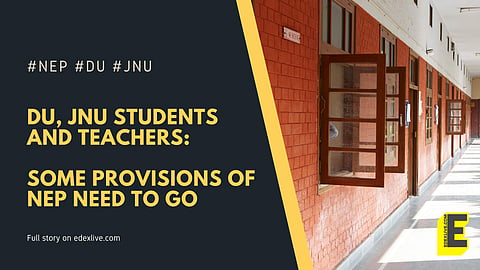

With the National Education Policy (NEP) to be implemented from this academic year, mixed reactions have been floating over the issue. While the Central Government has been hailing it, the students and teachers of Jawaharlal Nehru University and Delhi University, especially, do not agree. To counter this, DU students and teachers are observing a protest against the NEP on Friday, April 22. A delegation of students from JNUSU (JNU Students’ Union) had also gone to meet members of the University Grants Commission (UGC) to discuss certain issues on Thursday, April 21, some of them pertaining to the NEP.
The delegation had taken primarily four of their problems to the UGC. The first one had been a request to extend the MPhil-PhD terms, owing to the pandemic. “The research period was affected by the pandemic and an extension was granted for older batches,” clarifies Saket Moon, Vice-President of JNUSU. The revocation of non-NET fellowship and its reprocessing was another issue they had discussed. “This is an old issue and has been taken to the UGC before,” says Saket. The Students’ Union had also raised the demand for funds for infrastructural repair. And lastly, they had taken up their issues regarding the CUET (Common Universities Entrance test) and the scrapping of the MPhil programme from this year, according to the NEP.
“The government is not ready to see what the stakeholders are saying,” says Professor Abha Dev Habib, former office bearer, DUTA (Delhi University Teachers’ Association) Secretary, DTF (Democratic Teachers’ Front), explaining the issue. She states a number of problems that arise with the provisions mentioned in the NEP. The first of them is CUET. It was mentioned that the CUET will follow the NCERT pattern. “This will deprive the State Board students,” she rues. “This will also induce students to take coaching and that will create a new pocket for private coaching classes. Unless more seats are added in colleges and universities, two-thirds of the students will be pushed back,” she adds. These points were similarly argued by the members of JNUSU during their meeting with the UGC.
Professor Abha further states, “All NEP recommendations are private. They change the public funding structure of universities. JNU has taken a loan of 450 crores and DU can take a loan of Rs 1,000 crores. But the universities will have to pay back using students’ fees. This is another way of privatising.” She also highlights another problem with the NEP, which is regarding the extension of the undergraduate programme from three to four years. “From a study of the UGC draft, it can be seen that students are not really gaining anything with the extra year. It rather means more expense for the parents. Students are already paying Rs 15,000 to 20,000 every month. Another year will only add to this expense,” the professor says.
There are issues with academics too, they highlight. The NEP has recommended the removal of MPhil seats and slashing the number of PhD seats. Professor Habib opines that this again deprives the students. “The students who could not spend 5-6 years in PhD courses opted for the MPhil course,” she says. The JNU students also raised this issue. Another issue with the NEP that they highlight is the allowance for students to take online courses. “There is a whole push towards online business,” claims Dr Abha. There will also be loss of classroom learning and teachers will lose their jobs. “Students will be asked to take their own degrees. And contract teachers will be losing their jobs,” she says.
She also said that the issue was not new. It has been going on for the past two to three years, since the NEP was approved. The DU teachers had written to ministers as well. “We are doing class to class campaigns and there is a public meet tomorrow as well,” Dr Abha says. She also states that the NEP issue is spread all over India. The meet has been arranged by the SaveDU platform, formed in DU for the past ten years, to address such academic issues. While SaveDU continues to raise its voice, the JNUSU delegates, consisting of the three batch bearers of JNUSU, say that they had a positive response from the UGC. Their meeting lasted 40-45 minutes and the Additional Secretary of UGC was present with another official. The UGC said that it would look into the issues and address them. And for the PhD scholars and non-NET fellowships, it asked the concerned students to mail them the details individually.
